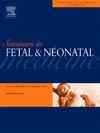基于机器学习的幼儿期多模态磁共振成像未来结果预测。
IF 2.9
3区 医学
Q1 PEDIATRICS
引用次数: 0
摘要
人脑从胎儿阶段到出生后两年经历了快速变化,其间适当的结构和功能成熟为日后的认知和行为发展奠定了基础。多模态磁共振成像(MRI)技术,尤其是结构磁共振成像(sMRI)、弥散磁共振成像(dMRI)、功能磁共振成像(fMRI)和灌注磁共振成像(pMRI),为在全脑和区域层面无创量化这些早期大脑变化提供了前所未有的机会。每种模式都能为了解典型神经发育的复杂过程以及精神和神经疾病的病理机制提供独特的见解。与单一模式相比,多模式磁共振成像增强了鉴别力,为了解和改善神经发育和心理健康结果(尤其是高危人群)提供了更全面的见解。基于机器学习和深度学习的方法已证明,利用幼儿期获得的多模态脑磁共振成像预测未来结果具有巨大潜力。在此,我们回顾了用于早期大脑发育成像的各种 MRI 技术的独特性,并介绍了分析这些模式的常用方法。然后,我们讨论了利用幼儿期多模态磁共振成像信息预测未来神经发育和临床结果的机器学习方法,强调了识别生物标记物以用于早期检测和对非典型发育进行个性化干预的潜力。本文章由计算机程序翻译,如有差异,请以英文原文为准。
Machine-learning based prediction of future outcome using multimodal MRI during early childhood
The human brain undergoes rapid changes from the fetal stage to two years postnatally, during which proper structural and functional maturation lays the foundation for later cognitive and behavioral development. Multimodal magnetic resonance imaging (MRI) techniques, especially structural MRI (sMRI), diffusion MRI (dMRI), functional MRI (fMRI), and perfusion MRI (pMRI), provide unprecedented opportunities to non-invasively quantify these early brain changes at whole brain and regional levels. Each modality offers unique insights into the complex processes of both typical neurodevelopment and the pathological mechanisms underlying psychiatric and neurological disorders. Compared to a single modality, multimodal MRI enhances discriminative power and provides more comprehensive insights for understanding and improving neurodevelopmental and mental health outcomes, particularly in high-risk populations. Machine learning- and deep learning-based methods have demonstrated significant potential for predicting future outcomes using multimodal brain MRI acquired during early childhood. Here, we review the unique characteristics of various MRI techniques for imaging early brain development and describe the common approaches to analyze these modalities. We then discuss machine learning approaches in predicting future neurodevelopmental and clinical outcomes using multimodal MRI information during early childhood, highlighting the potential of identifying biomarkers for early detection and personalized interventions in atypical development.
求助全文
通过发布文献求助,成功后即可免费获取论文全文。
去求助
来源期刊
CiteScore
6.40
自引率
3.30%
发文量
49
审稿时长
6-12 weeks
期刊介绍:
Seminars in Fetal & Neonatal Medicine (formerly Seminars in Neonatology) is a bi-monthly journal which publishes topic-based issues, including current ''Hot Topics'' on the latest advances in fetal and neonatal medicine. The Journal is of interest to obstetricians and maternal-fetal medicine specialists.
The Journal commissions review-based content covering current clinical opinion on the care and treatment of the pregnant patient and the neonate and draws on the necessary specialist knowledge, including that of the pediatric pulmonologist, the pediatric infectious disease specialist, the surgeon, as well as the general pediatrician and obstetrician.
Each topic-based issue is edited by an authority in their field and contains 8-10 articles.
Seminars in Fetal & Neonatal Medicine provides:
• Coverage of major developments in neonatal care;
• Value to practising neonatologists, consultant and trainee pediatricians, obstetricians, midwives and fetal medicine specialists wishing to extend their knowledge in this field;
• Up-to-date information in an attractive and relevant format.

 求助内容:
求助内容: 应助结果提醒方式:
应助结果提醒方式:


